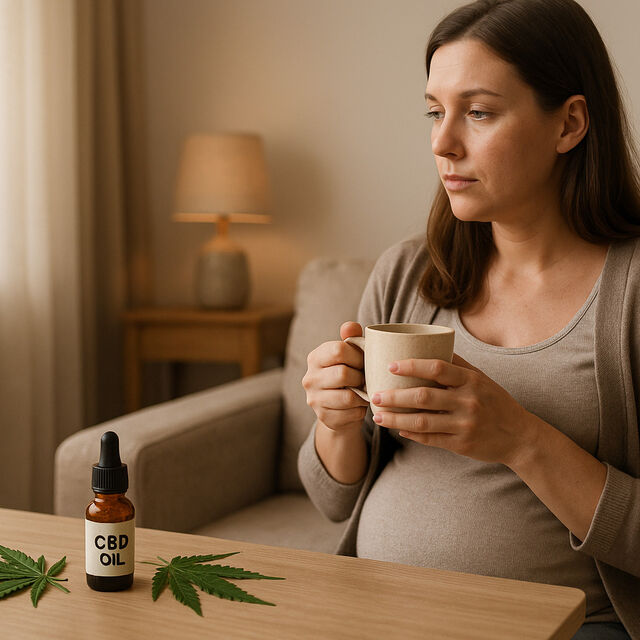Cannabis, CBD, and Pregnancy: What's the Evidence?
Key Takeaways
Safety Concerns: Major health organizations like ACOG and the CDC advise against using cannabis or CBD during pregnancy and breastfeeding due to risks to fetal development. The psychoactive compound THC is known to cross the placenta and may negatively affect fetal growth and brain development. Data on CBD’s safety in pregnancy is limited, and the lack of FDA regulation means product purity is often uncertain. Expectant parents should consult their doctor for safe, evidence-based alternatives for managing symptoms.
Cannabis and CBD are increasingly used to manage pregnancy symptoms like nausea, anxiety, and sleep issues. However, research shows these substances may pose risks to fetal development, including effects on growth, brain development, and long-term behavior1.
Key Points:
- Cannabis (THC): Linked to lower birth weight, slower growth, and potential developmental issues1.
- CBD: Limited research; safety during pregnancy is uncertain.
- Medical Advice: Major health organizations, including ACOG and the CDC, advise against using cannabis or CBD during pregnancy and breastfeeding2.
- Product Risks: Many CBD products are unregulated, with potential contamination or inaccurate labeling.
What Are Cannabis and CBD? Definitions and Uses
Cannabis and CBD Definitions
Cannabis is a plant that contains over 100 compounds known as cannabinoids. Among these, the most recognized is tetrahydrocannabinol (THC), the psychoactive ingredient responsible for the "high" associated with marijuana. THC is known for producing effects like euphoria and relaxation.
On the other hand, Cannabidiol (CBD) is another compound derived from the cannabis plant, but it doesn't have psychoactive properties. Unlike THC, CBD doesn’t cause a high or alter your mental state. Instead, it’s often marketed for its potential therapeutic effects, such as reducing inflammation, easing anxiety, or promoting relaxation - all without the mind-altering effects of THC.
The legal landscape around these compounds is complex. Hemp-derived CBD with less than 0.3% THC became federally legal in the U.S. under the 2018 Farm Bill. However, cannabis with THC levels higher than 0.3% remains illegal at the federal level, though many states have legalized it for medical or recreational use. This patchwork of laws means that the availability and legality of these products vary widely depending on where you live.
It’s also worth noting that CBD products may contain trace amounts of THC, and the FDA does not regulate most CBD products sold in stores or online3. This lack of oversight means the actual ingredients might not match what’s listed on the label. These factors are essential to understanding why some people, including expectant mothers, turn to these products.
Why Some Pregnant Women Use These Products
Pregnancy often comes with a range of uncomfortable symptoms, leading some women to explore alternative remedies. For instance, morning sickness, which affects up to 80% of pregnant women, can be debilitating. For those dealing with severe nausea and vomiting, conventional treatments don’t always work, prompting some to try cannabis in hopes of finding relief.
Anxiety and stress are also common during pregnancy. Hormonal changes, physical discomfort, and concerns about childbirth can create overwhelming feelings. CBD’s reputation as a “natural” option for reducing anxiety appeals to women who want to avoid prescription medications during pregnancy.
Sleep disturbances are another major issue, particularly in the later stages of pregnancy. Back pain, frequent trips to the bathroom, and general discomfort can make restful sleep elusive. Women who have used cannabis or CBD products prior to pregnancy might turn to them again, viewing them as potential sleep aids.
For those with chronic pain conditions like fibromyalgia, arthritis, or migraines, pregnancy can amplify their discomfort. Managing pre-existing pain while protecting the developing baby can feel like a difficult balancing act. The perception of plant-based products as “natural” and potentially safer often influences these choices.
Additionally, the normalization of cannabis use in states where it’s legal has changed perceptions. Professionally packaged products sold openly in dispensaries may seem more like legitimate medical options than illicit substances. These shifting attitudes help explain why some pregnant women consider cannabis or CBD as remedies.
How These Products Are Used
The way cannabis and CBD products are consumed plays a big role in how they affect the body - and the developing fetus. Smoking or vaping delivers cannabinoids directly to the lungs and bloodstream almost instantly, offering quick effects but also immediate exposure to the baby.
Edibles, such as gummies, chocolates, or baked goods, work differently. They take longer to kick in - usually 30 minutes to 2 hours - but their effects last longer. However, dosing can be tricky since edibles often contain higher-than-expected levels of THC or CBD.
Oils and tinctures, which are placed under the tongue, are absorbed relatively quickly through the mouth’s mucous membranes. This method feels more medicinal to some and allows for more precise dosing compared to edibles.
Topical products, like creams, balms, or lotions, are applied directly to the skin. While these are marketed as not significantly entering the bloodstream, research on their absorption during pregnancy is still limited.
Capsules and pills offer a consistent dose but take time to digest and absorb. Similar to edibles, they’re less ideal for situations where quick adjustments in dosing are needed.
The potency and purity of these products vary widely. In states where cannabis is legal, dispensary products undergo some testing, but standards differ by location. Products sold online or in unregulated markets often come with risks, such as contaminants, incorrect dosages, or unlisted ingredients.
Another critical factor is frequency of use. Occasional use creates different exposure patterns compared to daily use. Regular consumption can lead to the accumulation of cannabinoids in the body, potentially impacting the baby over time. These nuances highlight the importance of understanding how these products interact with pregnancy.
What Does the Research Show? Risks and Unknowns
Research on cannabis and CBD use during pregnancy is still in its early stages. Most studies have focused on THC-containing products, making it difficult to pinpoint the effects of other cannabinoids like CBD. Because of this limited understanding, experts urge caution. Below, we’ll explore specific developmental risks and areas where more research is needed.
Effects on Baby's Growth and Brain Development
Initial studies link prenatal cannabis exposure to lower birth weight and slower fetal growth1. THC, which can cross the placenta, may interfere with early brain development. Animal research suggests that exposure during critical developmental windows could alter brain structure and function, though how this translates to human development is not fully understood.
Timing seems to play a crucial role. While the early weeks of pregnancy are vital for forming major organ systems, brain development continues throughout the entire pregnancy. Cannabinoids present in breast milk could also influence an infant's development after birth, adding another layer of complexity.
Heart and Behavior Effects in Children
Long-term studies on the effects of prenatal cannabis exposure are limited. Some research points to potential links with attention and impulse control challenges in children, but the evidence is mixed and inconclusive4. Beyond concerns about growth and brain development, preliminary findings suggest that cannabis exposure could influence sleep patterns and cardiovascular health in infants. However, more robust studies are needed to confirm these findings and understand the full scope of risks.
THC vs. CBD: What We Know and What’s Unclear
When it comes to THC, the research is more extensive. THC is known to cross the placenta, and studies have investigated its effects on fetal growth and neurological development. On the other hand, research on CBD is sparse. While animal studies raise concerns about high doses of CBD, there’s very little human data to draw firm conclusions.
Another issue is product purity and dosage. Many products labeled as CBD may contain trace amounts of THC, and without strict regulations, it’s hard to know exactly what’s in them. This lack of clarity, combined with limited research, has led medical professionals to recommend caution when it comes to cannabis-derived products during pregnancy. Until more definitive answers emerge, it’s best to follow current medical advice and err on the side of safety.
Medical Expert Guidelines and Recommendations
Major health organizations strongly urge caution when it comes to using cannabis or CBD during pregnancy and breastfeeding. With uncertainties surrounding their safety and potential risks, the consensus among experts is to avoid their use altogether.
What Medical Experts Recommend
The American College of Obstetricians and Gynecologists (ACOG) is clear in its stance: marijuana use during pregnancy and breastfeeding is not advised2. They stress that there isn’t enough evidence to confirm its safety, and potential risks to fetal development make discontinuation the safest choice. ACOG encourages pregnant women to consult their healthcare providers for alternative, research-backed treatments.
The American Academy of Pediatrics also advises breastfeeding mothers to steer clear of cannabis use, citing concerns about the transfer of harmful substances through breast milk5.
The Centers for Disease Control and Prevention (CDC) echoes this caution, emphasizing that no amount of marijuana use during pregnancy is considered safe6. They warn that THC can cross the placenta and may interfere with fetal brain development.
The Food and Drug Administration (FDA) highlights another critical concern: the legal status of CBD does not equate to safety for pregnant or breastfeeding women. They also point out that many CBD products lack proper regulation, making it hard to know what’s actually in them or how potent they are3.
Experts consistently recommend that women experiencing pregnancy-related symptoms opt for proven, safe treatments. Healthcare providers can guide patients toward therapies that don’t carry the unknown risks tied to cannabis-based products.
Common Myths About Cannabis and CBD Safety
Despite these clear guidelines, misinformation about cannabis and CBD use during pregnancy continues to spread. Let’s break down some of the most common myths:
-
Myth: "Natural means safe during pregnancy."
Just because something is natural doesn’t mean it’s harmless. Tobacco and alcohol are natural but pose serious risks during pregnancy. Cannabis products fall under the same umbrella of caution. -
Myth: "Legal means safe."
Legalization doesn’t guarantee safety. Cannabis laws are based on policy decisions, not comprehensive safety data - especially when it comes to pregnancy. -
Myth: "CBD is completely different from THC and carries no risks."
While CBD doesn’t cause the psychoactive effects of THC, it still interacts with the body’s endocannabinoid system. Animal studies suggest it could impact reproductive health, and the lack of regulation in CBD products adds another layer of uncertainty. -
Myth: "Small amounts or occasional use won’t hurt."
There’s no established safe amount of cannabis or CBD during pregnancy. The developing fetal brain is highly sensitive, and even minimal use could potentially disrupt normal development. -
Myth: "Cannabis is safer than prescription medications for morning sickness."
While some prescription drugs do have risks, they’ve undergone rigorous testing and have known safety profiles. Cannabis and CBD, on the other hand, lack the same level of research. For severe morning sickness, pregnant women should work with healthcare providers to find safe, evidence-based solutions.
These recommendations underline the importance of evidence-based decision-making during pregnancy. Until more definitive research is available, avoiding cannabis and CBD remains the safest choice for both mother and baby.
Making Informed Decisions for Expectant Parents
Pregnancy comes with a host of decisions, and the topic of cannabis or CBD use can add even more uncertainty. With changing laws, conflicting advice, and limited research, many expectant parents feel unsure about what’s safe for their baby.
Dealing with Confusion and Mixed Information
The stigma surrounding cannabis use in pregnancy often pushes parents-to-be toward anecdotal advice from friends or online forums. Unfortunately, this means decisions are sometimes based on personal stories rather than solid scientific evidence.
To complicate matters, current medical guidelines rarely differentiate between types of cannabis use. Whether someone uses cannabis recreationally, to manage pregnancy symptoms, or as an alternative to other medications, the advice is often the same: avoid it altogether. While this blanket recommendation is aimed at safety, it can leave those with unique medical needs feeling overlooked and unsupported.
Another issue is biased or incomplete information. Some healthcare providers may share advice shaped by personal beliefs, rather than offering a balanced, evidence-based perspective. This can make it harder for pregnant individuals to make fully informed decisions and may perpetuate misunderstandings.
Steps for Making Research-Based Decisions
When faced with uncertainty, it’s important to rely on systematic, research-based information.
- Talk to your healthcare provider. Even if past conversations felt unhelpful, try again. Be clear about the specific information you’re seeking and ask your provider to focus on current research rather than personal opinions. If necessary, consult multiple providers to get a broader perspective.
- Seek out recent, peer-reviewed research. Cannabis studies are evolving quickly, so focus on studies published in the last five years. Pay attention to the size and quality of the research - larger, well-designed studies provide more reliable insights than smaller or poorly controlled ones.
- Evaluate your personal risk factors. Your medical history, any pregnancy complications, and other medications you’re taking all play a role in how cannabis or CBD might affect you and your baby. Generic recommendations may not address your unique circumstances, making personalized medical advice essential.
This thoughtful approach not only helps with immediate decisions but also supports long-term health planning for your family.
How Americord Supports Family Health
Planning for your family’s future health goes beyond pregnancy decisions. Americord offers a way to take proactive steps through newborn stem cell banking, including cord blood, cord tissue, and placental tissue preservation. These services provide access to regenerative medical options backed by science.
Americord’s dedication to transparency and rigorous standards reflects the same careful research process parents should use when evaluating health-related choices. Just as you’d investigate the safety of cannabis or CBD during pregnancy, Americord provides clear, evidence-based information about their AABB-accredited methods and the potential applications of stem cell banking. Pricing is subject to change, and Annual Fees only happen (in some cases). For the most up-to-date pricing and fee information, please visit our main pricing page: https://production.americordblood.com/pricing
Conclusion: Weighing Risks and Protecting Family Health
The current research suggests that the potential risks of using cannabis or CBD during pregnancy outweigh any unverified benefits. THC, the psychoactive component in cannabis, can cross the placenta and potentially impact fetal brain development. Meanwhile, studies on CBD remain limited, with most findings coming from animal research. Adding to the complexity, factors like product type, dosage, and timing of use make it challenging to provide tailored guidance for every individual.
Early studies have drawn connections between prenatal cannabis exposure and issues with attention, behavior, and cognitive development4, likely due to the heightened sensitivity of the developing brain. These findings have led major health organizations to consistently recommend caution.
Organizations such as the American College of Obstetricians and Gynecologists2 and the American Academy of Pediatrics5 generally advise against the use of cannabis and CBD during pregnancy and breastfeeding. For expectant parents dealing with severe symptoms like nausea, anxiety, or chronic pain, consulting with a healthcare provider to explore safe, evidence-based alternatives is a critical step.
Protecting your baby’s development starts with relying on trusted, up-to-date evidence and professional medical advice. Americord’s newborn stem cell banking offers a science-driven way to support your family’s long-term health. As research continues to grow, staying informed will remain essential for making choices that safeguard your family’s future.
FAQs
What are the possible long-term effects of using cannabis or CBD during pregnancy on a child's development?
Research indicates that using cannabis during pregnancy can have long-term effects on a child’s development. These may include restricted fetal growth, learning and memory difficulties, heightened anxiety, and behavioral challenges4. Similarly, prenatal exposure to CBD has been associated with possible disruptions in brain development, which could affect neural functions and behavior later in life.
These insights underscore the importance of steering clear of cannabis and CBD during pregnancy to promote healthy brain and emotional development in children. If you have any concerns or questions, consulting your healthcare provider is the best way to get tailored advice.
Why do health experts advise against using cannabis or CBD during pregnancy, even though they're legal in some states?
Health professionals advise steering clear of cannabis and CBD during pregnancy. These substances can pass through the placenta and potentially impact the baby’s development. Studies have linked their use to risks like low birth weight, slowed growth, and developmental challenges.
Even though cannabis and CBD are legal in certain states, leading organizations such as the CDC6 and FDA3 strongly discourage their use during pregnancy and breastfeeding. The main concern lies in the lack of definitive safety data and the potential harm these substances could pose to a baby. Given the uncertainties, avoiding cannabis and CBD during pregnancy is the safest choice.
What are some safe, evidence-based ways to manage pregnancy symptoms like nausea and anxiety without using cannabis or CBD?
Managing pregnancy symptoms like nausea and anxiety can be done safely and effectively without resorting to cannabis or CBD. For nausea, opt for small, frequent meals that include bland or protein-rich foods. Adding ginger to your diet - whether in tea, candies, or supplements - can also help settle an uneasy stomach.
When it comes to anxiety, calming activities such as prenatal yoga, meditation, and breathing exercises can make a big difference. You might also explore complementary therapies like acupressure, aromatherapy, or acupuncture, which are generally considered safe during pregnancy and may provide relief. Just make sure to check with your healthcare provider before trying any new remedies to ensure they’re suitable for you.
References
- National Library of Medicine. Marijuana Use During Pregnancy and Lactation: A Review of the Evidence
- American College of Obstetricians and Gynecologists (ACOG). Marijuana Use During Pregnancy and Lactation
- Food and Drug Administration (FDA). What You Should Know About Using Cannabis, Including CBD, When Pregnant or Breastfeeding
- JAMA Psychiatry. Prenatal Marijuana Exposure and Neurodevelopmental Outcomes: A Systematic Review
- American Academy of Pediatrics (AAP). Marijuana Use During Pregnancy and Lactation
- Centers for Disease Control and Prevention (CDC). Marijuana Use During Pregnancy




